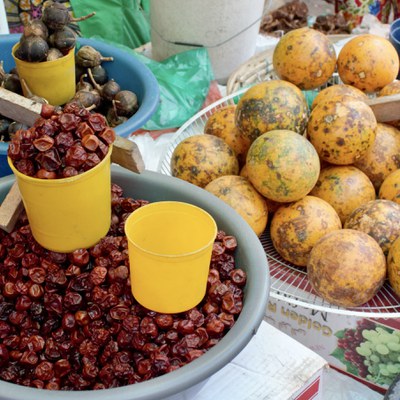BMZ Zambia Portfolios
Piloting incentive-based agricultural portfolios for nutrition and resilience in Zambia (BMZ Zambia Portfolios)
Work package: Value chains, indigenous food crops, entrepreneurial skills, business aspirations and upgrading strategies
Project Brief:
Availability and access to nutritious food throughout the year and poverty reduction constitute a major focus of development throughout Africa. With increasing biophysical threats to smallholder agricultural activities due to climate variability and change and depletion of soil fertility, attention is placed on how the collection of indigenous food crops and production of staple foods can serve as a complementary pathway to improve smallholders’ nutritional diets and poverty status. However, markets for many of these indigenous food crops are thin with unfitting coordination mechanisms and low smallholder entrepreneurial orientation and aspirations that limit the economic potentials of these crops across gender in terms of cash income generation in rural farming communities as well as diversified food baskets for consumers in urban areas.
In this context, the overall project aims to contribute to the reduction of malnutrition and poverty among farming households by developing smallholder-oriented interventions that help to minimize seasonal hunger and nutrient gaps and diversify smallholder diets and income opportunities in Zambia. Our project aims to bring nutrition and resilience to farming households by growing portfolios of diverse fruit ("food") trees including cultivated and wild fruits, integrated with existing systems of vegetables, pulses, staple crops, so that smallholders can improve their health, livelihoods, and their environment.
Components
We are developing and rolling out portfolios of micronutrient-providing trees (and other complementary crops) to a targeted 10,000 households. The project is operating in three provinces in Zambia (Eastern, Muchinga, Central). The project comprises six interconnected components, the first four are knowledge-based activities, which involve generating evidence for adapting and contextualising the food tree-crop portfolio innovation, and two outreach activities which lay the foundations for scaling.
Component 1. Evaluating food tree-crop portfolio adoption in Kenya using a nuanced adoption gradient to evaluate uptake of the technology to inform further piloting in Zambia.
Component 2. Customising nutritious food tree-crop portfolios for three localities in Zambia which will address seasonal food and nutritional gaps in local diets.
Component 3. Validating and refining food tree-crop portfolios through farm system analyses and understanding farmer aspirations, including gender and youth considerations.
Component 4. Laying the foundations for adoption and exploring market opportunities and value chain interventions for priority food tree-crop portfolio produce.
Component 5. Creating a conducive scaling environment through enhancing seed system infrastructure via three resource and delivery centres for quality seed and seedling production.
Component 6. Strengthening extension actor and smallholder farmer capacities, with at least 100 NARS, development organisation and private sector extension actors trained on food tree-crop portfolio establishment and management and developing and disseminating three tailored communication products to smallholder farmers.
Humboldt University leads Component 4 - Exploring market opportunities and value chain interventions for priority food tree-crop portfolio produce. The component focuses on how value chain development for indigenous food crops can provide incentives for diversified food systems. Specifically, it aims to i) assess existing value chains and potential actor-oriented strategies to upgrade and commercialize key indigenous food crops, ii) analyze the contingent bundling effects of entrepreneurship and resources on the business performances of value chain actors, iii) explore how small-scale actors deploy their inter-organizational relationships to improve their business performance in unstable environments, and iv) examine the effects of smallholder business aspirations and entrepreneurship on business diversification, marketing choices and agribusiness growth along the value chains of major food crops.
Project Duration: 01.01.2021 – 31.04.2024
Partners: International Centre for Research in Agroforestry (ICRAF), Community Markets for Conservation (COMACO), Zambian Agricultural Research Institute (ZARI), and University of Zambia (UNZA)
Funding: This project is supported from the German Federal Ministry for Economic Cooperation and Development (BMZ) commissioned and administered through the Deutsche Gesellschaft für Internationale Zusammenarbeit (GIZ) Fund International Agricultural Research (FIA)
Grant number: 81260863
Project website: https://worldagroforestry.org/project/piloting-incentive-based-agricultural-portfolios-nutrition-and-resilience-zambia
Publications: https://doi.org/10.1108/JADEE-06-2023-0134
Contact: Prof. Dr. Dagmar Mithöfer, Dr. Ayobami Adetoyinbo



